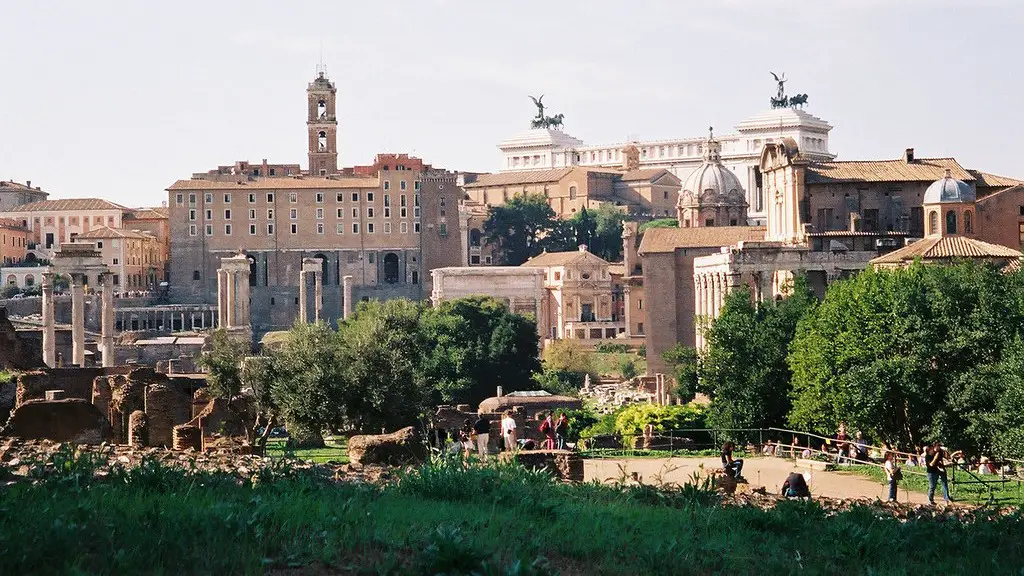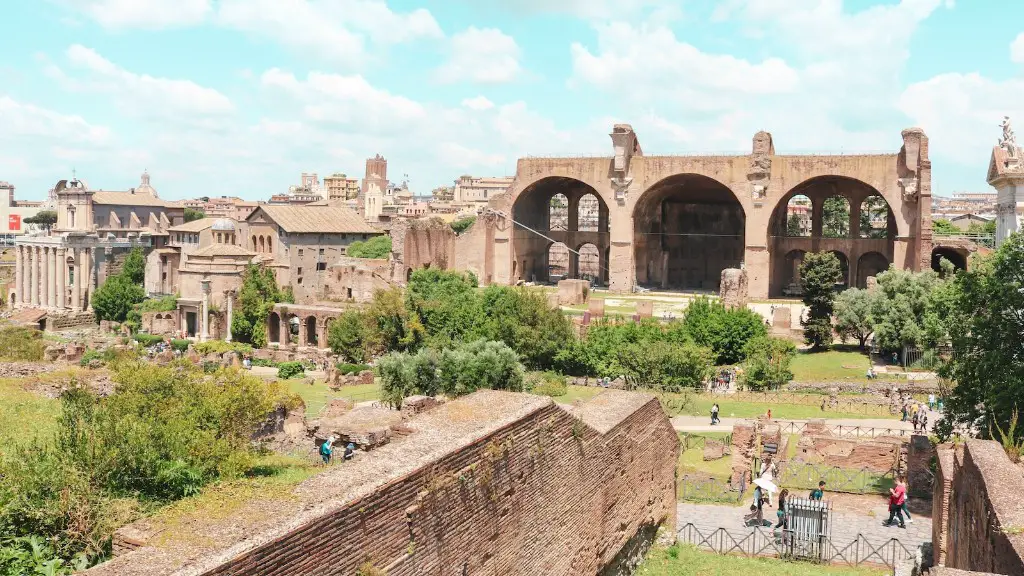Chapter 1: What were women’s responsibilities and roles in Ancient Rome?
Ancient Rome holds a special and fascinating place in history with its grand yet powerful empire ruling much of the known world for centuries. Inevitably, this brings with it an abundance of artefacts, writings, and stories, which provide insight into life in Ancient Rome. One particular interest is that of the role of women, who despite living in a heavily patriarchal society, held an important role that extended far beyond the confines of the home.
Women in Ancient Rome were often tasked with managing households, caring for children, spinning yarn and engaging in other ‘domestic’ tasks such as cooking and cleaning. This was done to keep the household running smoothly and efficiently. Women also worked outside of the home in professions such as tailoring, dyeing, and weaving. Women were able to inherit property, own businesses, and enter into legal contracts which suggests that they had significant financial autonomy. Certain evidence indicates that some women may even have owned slaves.
Chapter 2: The influence of powerful women in Ancient Rome
Female influence in Ancient Roman society was not relegated to the domestic sphere alone. Many of the powerful women who emerged during this period are famous for their remarkable contributions to society. For example, Livia Drusilla, the wife of Augustus, is credited with using her marriage to the emperor to bring stability to the Roman Empire.
Another prominent figure is Agrippina the Younger, who was another influential woman in Ancient Rome and the wife of the Emperor Claudius. Agrippina was a powerful political figure who used her influence to win favour with the emperor and appointed herself to the Senate. Furthermore, she was a force in the lives of her children, especially her son Nero, who would become emperor himself. Her influence was so great that Nero requested her to become his consort following her second husband’s death.
Chapter 3: Women and Religion in Ancient Rome
Religion was an integral part of Ancient Roman life, and for women, this was particularly so. Female deities were widely worshipped and respected in Ancient Rome, with goddesses such as Juno, Venus, and Minerva having temples dedicated to them. The Vestal Virgins were female priestesses who served the goddess Vesta, a popular figure in Roman religion. The Vestal Virgins were a respected and important faction within Ancient Roman society, and took great pride in their priestly duties.
Religion was a way for Roman women to have a small degree of agency in terms of their status within society. Although they could not participate in politics, they could play a significant role in religious activities and foster personal relationships with powerful religious figures.
Chapter 4: Education and Status of Women in Ancient Rome
Women in Ancient Rome were not denied access to education, though it was rather limited to certain subjects. A woman’s education was typically limited to basic literacy, numeracy and household management. Even with this limited level of education, Roman women of a certain social class could develop a certain degree of power and influence, as evidenced by many of the powerful women of the period.
Women had a somewhat limited, though still significant role in Roman society with some female gods, such as Juno and Minerva, mainstays of both religion and, to some degree, governance. Furthermore, women could own and inherit property and engage in legal contracts, granting them a degree of economic autonomy.
Chapter 5: Women and Marriage in Ancient Rome
Marriage was a staple of Ancient Roman society and women effectively had no say in the matter. Women were expected to marry a man of a social standing equal to or greater than her own, to ensure that the status of the family was maintained. Divorce and remarriage, while allowed, was not necessarily the norm.
When married, women had to take their husband’s public name, causing them to lose any maternal bonds, and any impact their family name and status may have had on their life. Furthermore, once married, women were seen as the property of their husband and were expected to abide by his every whim. This caused some women to become very little more than slaves in their own homes.
Chapter 6: Women and Politics in Ancient Rome
Women in Ancient Rome were denied the right to vote and participate in the Roman Senate and other state-level debates. Women, who were seen as incapable of making political decisions, were instead restricted to managing the household and caring for children. Women were not seen as physically or mentally capable of participating in politics and were effectively confined to a patriarchal society.
This of course, did not prevent some women, who came from wealthier and more influential families, from having a significant amount of political power. Women, who were often overlooked or dismissed, still managed to gain favour, favouritism and political influence through a network of relationships.
Chapter 7: Women and the Law in Ancient Rome
Women in Ancient Rome were subject to their own unique set of laws, which strongly favoured the male citizens of the empire. Women, who had no political standing or legal agency, could not bring cases or sue anyone. Women, who were written out of the law, were almost not considered citizens and had to rely on the male influence in their lives to exercise their rights.
The law gave absolute authority to the head of the household, usually the husband, who could punish his wife for disobedience if he deemed it necessary. Furthermore, in the event of a woman-instigated divorce, she was required to return any property she had been willed or inherited to the appropriate male heir. Women had extremely limited rights when it came to the law, leaving them almost always with no legal agency.
Chapter 8: Women and the Workforce in Ancient Rome
Women in Ancient Rome had some presence in the workforce, with female occupations including weaving, sewing and dyeing. Women also had a presence in marketing and commerce, with evidence of women running shops and businesses as far back as the 1st century BC.
Generally, women’s work was accepted and respected in Ancient Rome, with upper-class women being seen as entrepreneurs and marketeers, and lower-class women as necessary to the economic well-being of the family. Well-educated women of the patrician class also often held teaching positions, equipping Roman boys with skills that would help them later in their lives.
Chapter 9: Women and Power in Ancient Rome
Women in Ancient Rome had varying degrees of power, depending on their social class and family connections. Lower-class women were denied most forms of power, since they had limited access to resources and education. Upper-class women often had a greater degree of agency, through their access to education and other resources. They used these resources to build networks and cultivate relationships which could grant them some degree of power.
Though a woman’s power was generally seen to derive from the male members of her family, some women such as Livia Drusilla and Agrippina the Younger were powerful political figures in their own right. These powerful women used their influence to affect the outcome of wars, religious worship, the succession of powerful rulers, and were a major force in the Roman Empire for centuries.
Chapter 10: Women and Society in Ancient Rome
The role of women in Ancient Rome was shaped largely by the values and beliefs of the society in which they lived. Patriarchy was the norm, with women’s lives being heavily restricted, particularly for those of a lower class. Women were problematically viewed as the property of their husbands and denied access to the legal and political realms.
Despite this, women played an important role in Ancient Roman society and often managed to, through one means or another, gain a degree of power and influence. Although women of different classes had varying levels of power, all played an important role in Ancient Roman life.


